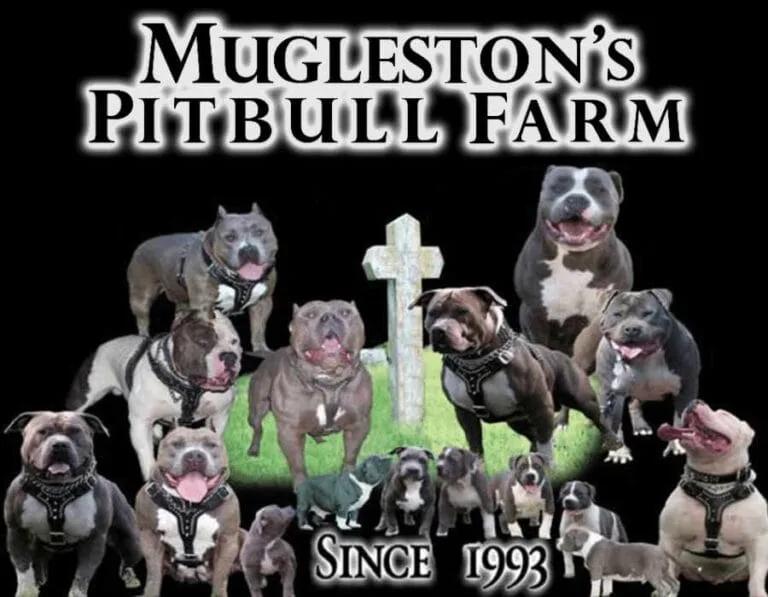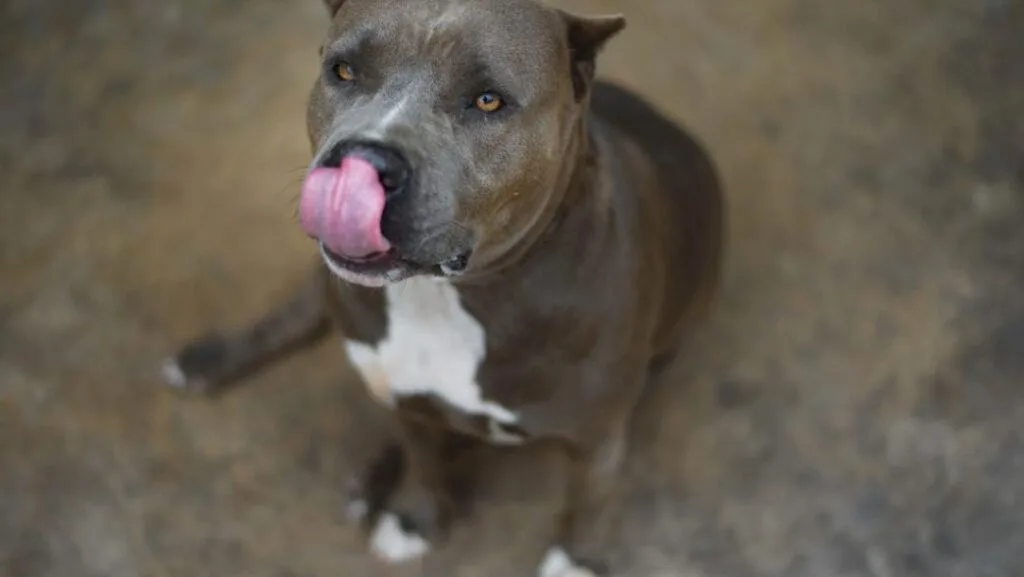
Complete Nutrition for Pit Bull. What is The Best Diet for Pitbulls?
Did you know Pit Bulls need up to 22% protein to stay strong and muscular? Knowing what they need is key for their happiness and health. These dogs, also called pit bulls, velvet hippos, or bullies, have special dietary needs like American Staffordshire terriers.
So, finding the best dog food for pitbulls is essential. Let’s find out what is the best diet for pitbulls below!

Essentials for a Healthy Pittbull
- A balanced pit bull diet is rich in proteins, carbohydrates, fats, vitamins, and minerals.
- Protein sources like chicken, beef, fish, and lamb are crucial for muscle maintenance.
- Carbohydrates such as brown rice, barley, and sweet potatoes provide necessary energy.
- Essential fats from fish oil, flaxseed, and chicken fat help maintain a healthy coat and skin.
- Common allergens to avoid include corn, wheat, and soy, ensuring a diet suited to sensitive pit bulls.
Nutritional Standards for Pitbull Dogs
It’s vital to make sure our Pitbulls get the right nutrients for their health. We need to know about the macronutrients and micronutrients they need. What are they?
Ideal Micronutrients for Pitbulls
Micronutrients, though needed in small amounts, are vital for our Pitbulls. Vitamins and minerals in fruits and veggies are key. They help fight off damage and keep our pets healthy.
Adjusting their diet based on age and activity is important. Puppies need special food for slow growth, while seniors may need less protein. Watching their calorie intake helps keep them healthy and prevents weight gain.
Ideal Macronutrients for Pitbulls
For Pitbulls, the right mix of proteins, fats, and carbs is key. Puppies need 22% to 32% protein in their diet. Good protein sources include beef, chicken, lamb, fish, and eggs.
Healthy fats are also crucial. Fish oil and flaxseed oil are great for energy and a shiny coat. Carbs should make up 35% to 45% of their food. Choose whole grains and sweet potatoes for energy and digestive health.
By focusing on the right nutrients, we can ensure our Pitbulls stay healthy and happy for years to come.
What Pittbull Dog Food Meets AAFCO Standards?
When choosing food for your pitbull, it’s important to select products that meet the AAFCO (Association of American Feed Control Officials) standards. AAFCO sets nutritional guidelines to ensure that pet foods provide complete and balanced nutrition for specific life stages, such as growth, maintenance, and reproduction.
For pitbulls, which are active and muscular dogs, the food should meet the AAFCO standards for either adult maintenance or growth, depending on your dog’s age and needs.
Dog food that meets AAFCO standards contains the right balance of proteins, fats, vitamins, and minerals to support your pitbull’s overall health. Popular brands like Blue Buffalo, Royal Canin, and Hill’s Science Diet often meet these standards and offer formulations designed for active or large-breed dogs like pitbulls.
It’s essential to check the packaging for a statement indicating that the food meets AAFCO standards, ensuring that it provides the complete nutrition necessary for your pitbull’s life stage.
Types of Dog Food for Pitbulls
Choosing the right dog food is key for our Pitbulls’ health. We’ll look at dry, wet, grain-free, raw, homemade, and high-protein options. Each type has its benefits for our furry friends.
Dry Pitbull Food
Dry food, or kibble, is one of the most popular and convenient options for feeding pitbulls. It is easy to store, cost-effective and helps with dental health by reducing plaque buildup. High-quality dry dog food specifically formulated for active breeds like pitbulls often contains balanced nutrients, including protein, healthy fats, vitamins, and minerals to support their energy levels and muscle development.
Wet Pitbull Food
Wet food can be an excellent addition to a pitbull’s diet due to its higher moisture content, which helps with hydration and may be easier to digest for dogs with sensitive stomachs. It is also more flavorful, which can be appealing to picky eaters. However, it is important to choose wet food that offers complete nutrition and is not just a treat or filler.
Grain-Free Food
Grain-free diets have gained popularity for pitbulls, especially for those with grain allergies or sensitivities. These diets typically focus on protein-rich ingredients like meat and vegetables instead of grains like wheat or corn. While grain-free food can be beneficial for some dogs, it’s essential to ensure the food still provides all the necessary nutrients for overall health.
Raw Pitbull Food
The raw diet, also known as the BARF (Biologically Appropriate Raw Food) diet, includes raw meat, bones, and organ meats. Advocates of raw feeding believe it mirrors a dog’s ancestral diet and promotes healthier skin, teeth, and digestion. However, raw feeding requires careful planning to avoid nutrient imbalances and the risk of bacterial contamination, so it’s important to consult a vet before starting this diet.
Homemade Food
Homemade dog food allows you to control exactly what your pitbull eats, tailoring the diet to specific nutritional needs or preferences. A well-balanced homemade diet typically includes lean meats, vegetables, and sometimes grains or supplements. However, crafting a nutritionally complete homemade diet can be challenging, so consulting a veterinarian or pet nutritionist is essential to avoid deficiencies..
High-Protein Food
Pitbulls are muscular and highly active dogs, making a high-protein diet essential for maintaining muscle mass and energy levels. Look for foods that list quality animal proteins, such as chicken, beef, or fish, as the primary ingredient. High-protein dog food helps pitbulls meet their daily energy demands, supports healthy growth, and promotes a strong, lean body.
Ingredients to Choose vs Avoid in Pitbull Food
Choosing the right food for our Pitbulls is key for their health and happiness. Pitbulls have loving personalities and strong bodies. They need a balanced diet that supports their active lifestyle and health needs.
Ingredients to Choose
When picking food for our Pitbull, focus on healthy pitbull ingredients. Look for high-quality proteins like real meats—fish, poultry, turkey, or duck. These help build muscles and keep them healthy.
Adding omega-3 fatty acids from fish oil is good for their coat and skin. Fruits and vegetables like blueberries, carrots, and sweet potatoes are also great. They boost immunity and reduce inflammation. Single protein sources can also help manage allergies.
Ingredients to Avoid
On the other hand, avoid harmful dog food ingredients. Chemical preservatives like Butylated Hydroxyanisole (BHA) can cause stomach and skin problems. Low-quality by-products like meat meals can upset their stomachs.
Simple carbs like white flour add little nutritional value and can cause weight gain. Also, harmful fats like rendered fat and vegetable oils can lead to inflammation and health issues. Avoiding these ingredients helps prevent allergies, keeps them at a healthy weight, and supports their overall well-being.
Fulfill Your Pit Bull Nutritional Needs to Keep It Healthy and Happy!
A balanced diet is key for a Pit Bull’s health and happiness. These dogs need high-quality protein, carbs, and fats to thrive. A good diet helps with shedding, dander, and digestive issues, keeping them lively and long-lived.
Meeting your Pit Bull’s dietary needs is more than just feeding them. It helps prevent allergies, obesity, and heart problems. Since Pit Bulls are energetic and strong, their diet must match their needs. Proper nutrition, exercise, and training improve their life quality.
Any Questions
What is the best diet for pit bulls?
Pit bulls need a diet full of quality proteins, fats, and carbs. They also need vitamins and minerals. Good choices include lean meats, fish oil, and whole grains or veggies like sweet potatoes.
What macronutrients are ideal for pit bulls?
Pit bulls do well on a diet with lots of protein (20-22% for active dogs), healthy fats, and some carbs. Protein from beef, chicken, and fish keeps their muscles strong. Fats give them energy and help their skin and coat. Carbs from whole grains and veggies give them energy and help with digestion.
What micronutrients should be included in a pit bull's diet?
Pit bulls need vitamins and minerals from fruits, veggies, and natural foods. These help keep them healthy, fight off damage, and manage allergies and heart issues.
What pit bull dog food meets AAFCO standards?
AAFCO-approved dog foods are tested to ensure they’re complete and balanced. Look for the AAFCO statement on the label to know it meets your pit bull’s nutritional needs.
What ingredients should I choose for my pit bull's diet?
Choose whole meats like beef, chicken, and fish. Add omega-3s from fish oil. Include fruits and veggies like blueberries, carrots, and sweet potatoes for extra vitamins and minerals.
What ingredients should I avoid in my pit bull's diet?
Stay away from BHA, low-quality by-products, simple carbs like white flour, and unhealthy fats. These can cause problems like inflammation and digestive issues.
How can I fulfill my pit bull's nutritional needs?
Give your pit bull a balanced diet with quality proteins, carbs, and fats. Adjust their diet based on their exercise, age, and health. This keeps them healthy and happy, managing risks like allergies and obesity.
